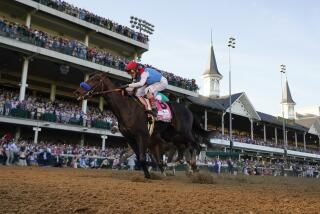A Court Is Off the Track
- Share via
On a sunny Sunday afternoon a year ago the engineer of a Conrail freight train ignored two trackside signals and drove his locomotive into the path of a 14-car Amtrak passenger train bound from Washington to Boston. Sixteen persons perished in the deadliest accident in Amtrak’s history. Later the National Transportation Safety Board formally found that the engineer, Ricky L. Gates, did not stop his train because his judgment was impaired by marijuana.
Gates, who pleaded guilty to manslaughter on Tuesday, was found out in part because, under federal regulations, he was forced to submit to urine and blood testing for drugs and alcohol immediately after the accident. A Conrail brakeman, Edward Cromwell, later confirmed that he had been smoking marijuana with Gates in the cab shortly before the accident.
If that accident had happened this week instead of a year ago, the case might have turned out quite differently. That is because the federal regulations requiring that train crews undergo post-accident testing for drugs and alcohol have been struck down by a panel of the U.S. Court of Appeals for the 9th Circuit in a 2-1 decision that we consider misguided.
Like the appeals court’s majority, we believe that drug testing ought to be used sparingly and only after careful consideration of whether it infringes on the right of Americans to be free from “unreasonable searches and seizures.” But that Fourth Amendment right, like most constitutional liberties, is not absolute; not all searches and seizures are prohibited, only the unreasonable ones. And in the case of railroad crews we think that drug testing is not only reasonable but desirable.
Circuit Judge Thomas Tang, the author of the majority opinion, employed the usual standard for measuring the reasonableness of a search--he balanced the government’s need for testing train crews against the intrusiveness of the drug tests. He concluded that post-accident testing was far too sweeping and that testing should be permitted only if there was “particularized suspicion” that an individual employee was using drugs. We have no quibble with his method, only with his conclusion.
It seems to us that in this case the government’s, and ultimately the public’s, interest in the safe and efficient operation of the railroads far outweighs train crews’ expectations of privacy. From the moment they are hired, the members of train crews are on notice that they cannot use alcohol or drugs on the job or while on call. They work in an industry regulated by the federal government. On passenger trains they are often responsible for the safety of hundreds of people; on freights they haul tons of hazardous substances through our cities and past our homes. As Circuit Judge Arthur A. Alarcon pointed out in his dissent, a locomotive “becomes lethal when operated negligently by persons who are under the influence of alcohol or drugs.”
We agree with the appeals court that, for most workers in all but a handful of industries, drug testing should be allowed only when there is a “particularized suspicion” of drug use, triggered by some change in the employee’s behavior that has been observed by qualified supervisors. But we would put train crews--like airline pilots, air-traffic controllers, bus drivers and nuclear-power-plant operators--in a special category: Their work directly affects public health and safety. A search that is unreasonable for others is reasonable for them, especially after a fatal accident.
Drug testing has increasingly divided the federal courts. Testing now has been struck down for police officers, firefighters and train crews but upheld, at the circuit court level, for customs workers, jockeys and prison guards. With the lower courts in disarray and brakemen and train engineers less likely to be tested than customs workers, it seems to us time for the U.S. Supreme Court to step in and settle the rules of the game.
More to Read
Sign up for Essential California
The most important California stories and recommendations in your inbox every morning.
You may occasionally receive promotional content from the Los Angeles Times.













